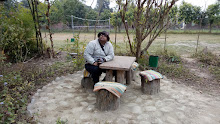“Praised be You, my Lord,
through our Sister Mother Earth,
who sustains and governs us,
and who produces various fruit
with coloured flowers and herbs.”
through our Sister Mother Earth,
who sustains and governs us,
and who produces various fruit
with coloured flowers and herbs.”
- from The Canticle of the Creatures by St. Francis of
Assisi
What is WILD FLORA?
Flora is the plant life occurring in a particular region or
time, generally the naturally occurring or indigenous—native plant life. So,
Wild plants include flowers, grasses, lichens, fungi, shrubs and trees that
grow with little or no human help or interference. They have not been
intentionally planted by human hands. Many of the smaller wild plants are
usually dismissed as 'weeds', and someone once said that weeds are flowers
growing in the wrong place! Gardeners prefer to keep their flowerbeds without 'weeds'
because they are the preserve of plants that the gardener specifically chooses.
While wild plants can be found anywhere, even in the best kept gardens,
usually, they are best viewed in more wild places such as waste places, fields
and meadows, hedgeows, wetlands, hill and mountain areas and in coastal areas.
What are the INTRINSIC VALUES of Wild Flora ??
First of all, wild flora are God's creation, and therefore
have intrinsic value. For the writers of scripture, for many of the early
Christian fathers, and for St. Francis, wild plants point beyond themselves to
God their Creator and God reveals Himself through them. This does not take away
from the fact that they are beautiful in and of themselves, and for those
blessed enough to see their beauty, wild plants provide endless hours of
pleasure.
How Wild Flora are IMPORTANT TO HUMANS??
Wild Flora are part of nature's biodiversity. They provide
the variety of food needed to sustain a rich and healthy biodiversity of
insects, birds, and animals. Some insects feed off particular plants so that a
loss of a wild plant in an area could lead to the loss of an insect! This is
how biodiversity can become depleted.
From a human perspective, plentiful biodiversity in a
farming landscape ensures that food grown is of the highest quality. Livestock
that feed on flower-rich pastures produce milk and meat with a higher nutrient
content that those that feed on pastures devoid of flowers. The variety of
insects that the many different wild plants attract and sustain provide a free
and natural pest-control for farm crops so it is worth farmers' while to
maintain a flower-rich margin around their fields. Also contact with the
natural environment is good for human health and wellbeing!
How to PROTECT WILD FLORA??
The best way to protect and save wild flora is by learning
how to identify them, and there are now plenty of books and online resources
that can help the learner. Use these resources whilst also visiting the places
where you can view the plants themselves. It is worth beginning in your own
garden, backyard, or neighbourhood
because usually there is plenty to see.

%5D+ban+tulsi.JPG)










0 comments:
Post a Comment